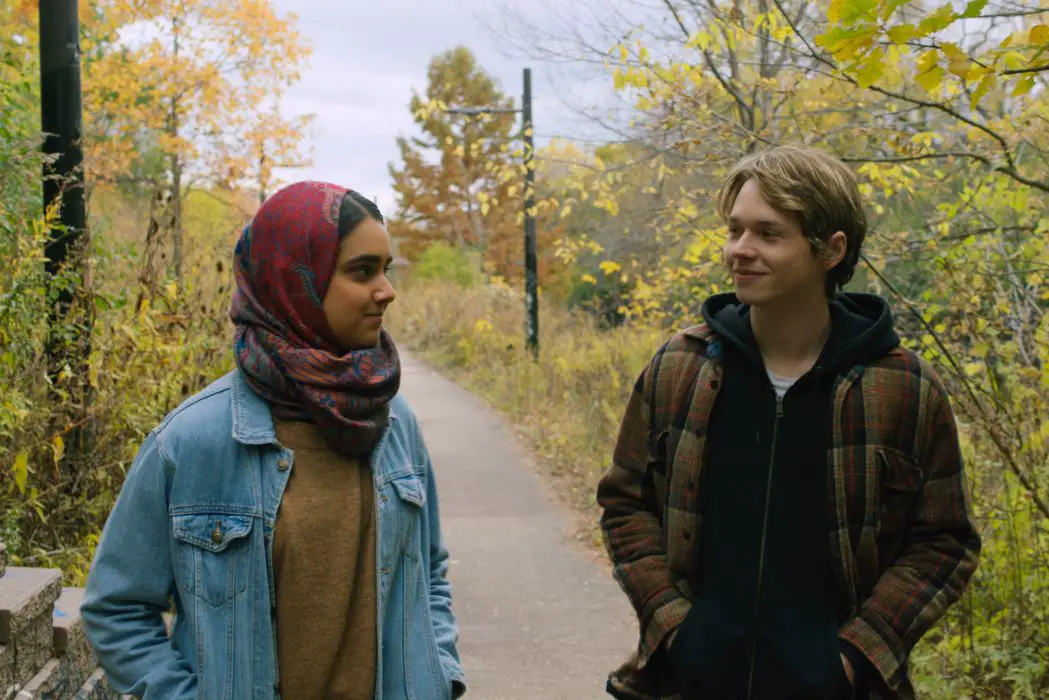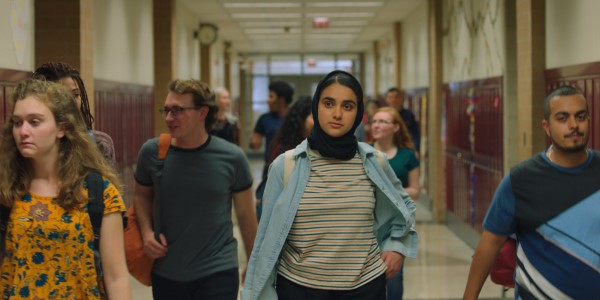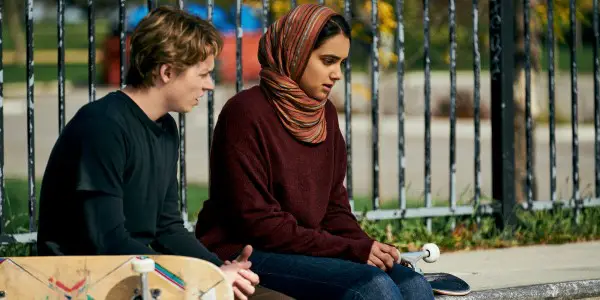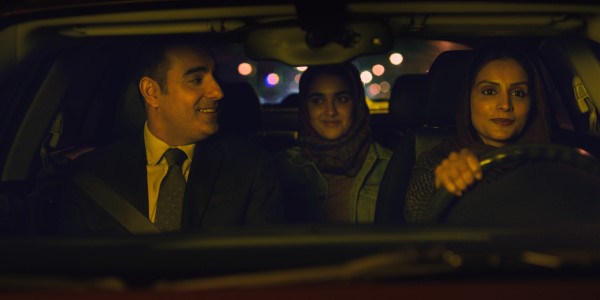HALA: Far More Nuanced Than The Trailer Suggests

Musanna Ahmed is a freelance film critic writing for Film…
Misrepresentation is always going to be a charge faced by any writer who depicts a veiled Muslim character. Hala was forced to bear the brunt of critical assumptions by a trailer that just didn’t quite capture what the movie is really about.
Contrary to Twitter belief – no, this is not a movie about a white guy liberating an oppressed Muslim girl or a hijabi abandoning her faith. Minhal Baig‘s debut feature film is far more nuanced and powerful than the preview suggests. Not unlike how any hijab-wearing woman is a far more complex human than the stereotypes suggest.
It isn’t even centred on the interracial love story
A two-minute trailer simply cannot capture the subtlety and restraint that powers Baig‘s storytelling. Would it have been better to never show an image of the titular protagonist (played by Geraldine Viswanathan) without her hijab or avoid any hints of the romantic subplot with Jesse (Jack Kilmer)? Obscuring such details would be suggesting an entirely different film, with different intents and purposes.

The simple truth of Hala’s premise is that it’s a coming-of-age drama about a Pakistani-American teen at the difficult crossroads of student life – the end of high school, the beginning of college – whose life gets further complicated when she’s forced to recontextualise her familial bonds following certain revelations. It’s a journey that doesn’t evolve in mere plot points but rather through full-length character explorations, rewarding viewers with a sensitive, poignant depiction of family through a particular cultural lens and a coming-of-age tale told from an underrepresented perspective.
Whilst the film begins with a reckless sequence of Hala fantasising in the bathroom and being chastised by her mother Eram (a wonderful Purbi Joshi) for missing her morning prayers, it ends on a sanguine note, as Hala sharply threads the needle between her somewhat conservative household and the spaces outside of it.
Effectively utilising still photography
Even when Hala is trapped in the fissure between Eram and Zahid, her father (a superb Azad Khan), it never becomes an issue that one space is supposedly better than the other, as if the house is a jail of sorts. The question is how the two can bring out the best of each other for the people that inhabit them. The worst moments for the family unit do not revolve around the extent of their religious observance or cultural traditions – they happen when honest communication is either lost or withheld.

In addition to the writing, why the idea of spaces is so prominent is because of cinematographer Carolina Costa’s outstanding compositions, largely using still photography from angles that allow her to capture depth and detail of the Masood family’s carefully arranged house. In one of the most striking frames of the movie, we see Hala in another room eavesdropping on her parents having an argument in the kitchen. The rule of thirds is expertly utilised to divide the image into three, with an exit door in the middle of the characters on either side.
Drawn from the filmmaker’s own upbringing, Hala is situated in the difficult position of portraying a certain community whilst also being a deeply personal tale. The question of burdening any artist of colour with the responsibility to speak for an entire community is worth an entire essay itself, but the point of this film isn’t to provide a microcosm of the Pakistani diaspora, even if there is a specific context. As Baig described it in a previous interview, “This is a coming of age story that happens to have a woman that’s Pakistani American and Muslim.”
The love between a mother and daughter
The choices Hala makes, from skateboarding against her mother’s desires to her college options, are part of the bigger narrative of self-actualisation, full of universal truths of teenage life. The hook of Hala, though, is the journey between Hala and Eram, a frictious relationship that slowly heals as they come to better understand each other. Think Lady Bird but in an immigrant context.

Geraldine Viswanathan doesn’t hail from the labelled ethnic background but is terrific in the titular role, beautifully navigating fresh regions of dramatic acting following her breakthrough performance in the uproarious Blockers. In a double act of different spoken languages (English and Urdu) Viswanathan and Joshi prove a natural fit together as mother and daughter.
Hala: Conclusion
Going for broke with a debut feature that was inevitably going to stir the pot, Minhal Baig thoughtfully treads through the cultural and ideological territory presented here, an outcome that could only be achieved from the accounted experience of a Pakistani-American women. The filmmaker marries an American indie aesthetic with a uniquely immigrant narrative for something fresh, vital and worthwhile. I admire Apple TV+ for coming out of the gate with such a significant film and I implore skeptics to watch Hala in its entirety.
What did you think of Hala? Let us know in the comments below.
Hala is available worldwide via Apple TV+.
https://www.youtube.com/watch?v=4aS-qGHH6E0&t=10s
Does content like this matter to you?
Become a Member and support film journalism. Unlock access to all of Film Inquiry`s great articles. Join a community of like-minded readers who are passionate about cinema - get access to our private members Network, give back to independent filmmakers, and more.
Musanna Ahmed is a freelance film critic writing for Film Inquiry, The Movie Waffler and The Upcoming. His taste in film knows no boundaries.












